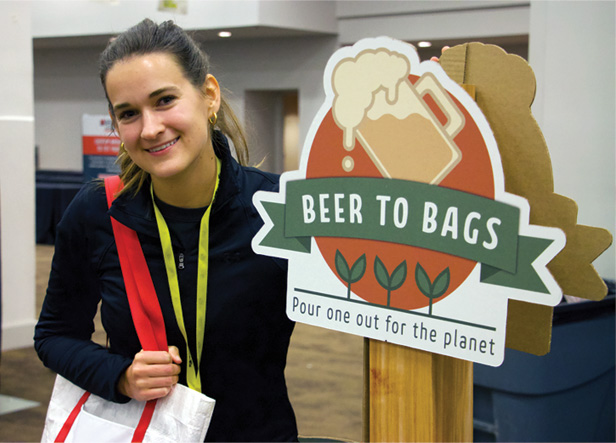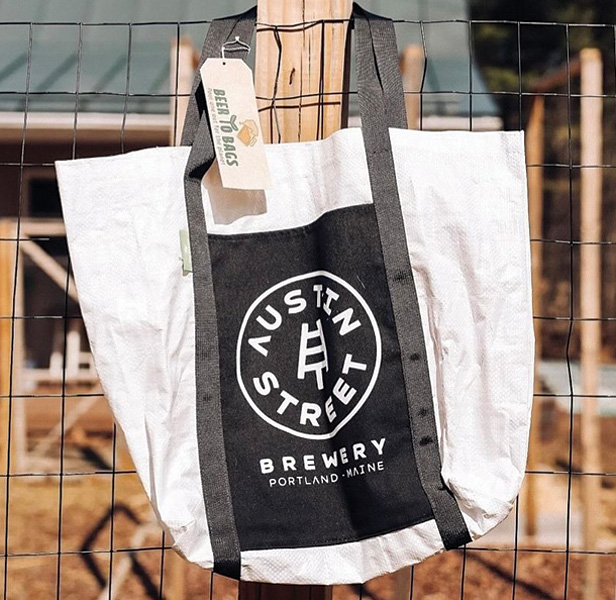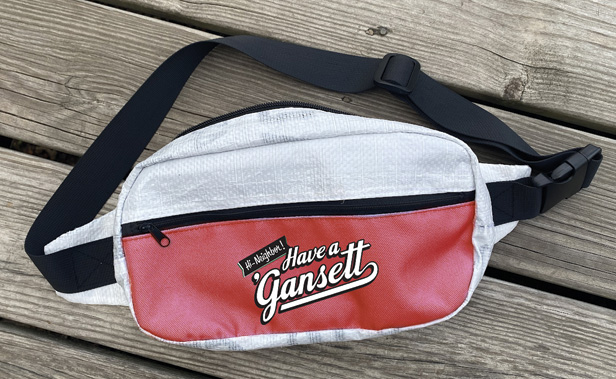Sustainability July 19, 2024
Sustainability Brewing: Brand Upcycles Beer Industry’s Waste Into New Products
Emily Neville launched Beer to Bags a few years after starting a clothing upcycling business in college.
Emily Neville started her first business at 19 while she was studying at North Carolina State University in Raleigh. The political science major with a longtime love of sewing and a passion for sustainability combined those two interests into fashion upcycling business Reborn.
“The initial concept was to upcycle individual clothing, turning sentimental items into things like T-shirt quilts, pet bandanas and pillowcases,” the now 26-year-old says. “If you’re using existing materials, you’re being very sustainable because you’re avoiding making net new fabrics and materials and using net new energy and operations.”

Emily Neville started Beer to Bags out of a desire to create sustainable upcycled products.
As her fledgling company grew, Neville started delving into the world of corporate upcycling, transforming deadstock from companies like Delta Air Lines, Sunbrella and Red Bull into new products. But the problem Neville kept running into was the lack of repeatability – corporate upcycling requests weren’t a steady, reliable source of material, and handling their one-off projects required unique solutions that took up precious time and resources.
Enter the craft beer market – a $29 billion industry with a devoted following, a need for standout branded merch and, it turns out, a steady stream of waste products ready to be diverted from the landfill and turned into something new.
“Raleigh Brewing Company reached out to me and said, ‘Hey, we’re throwing away around 200 of these single-use polypropylene malt bags every week. Can you upcycle these?’” Neville recalls. “That really sparked my interest because it was the first time I had run across a consistent source of material.”
Neville soon discovered that there are millions of single-use malt bags – made of the same material as many reusable shopping totes – entering landfills each year. Thus was born her next business venture: Beer to Bags.

Single-use polypropylene malt bags offer a steady supply chain for upcycling into products like shopper totes.
It took three years to develop a winning bag design, that incorporated customizable straps and an outside pocket made of recycled polyethylene terephthalate or canvas that can be branded with dye sublimation or screen printing.
Beer to Bags products are now sold in more than 200 breweries across the country and the company has recently expanded into the grocery market. The bags are being sold in five Lowes Foods locations in North Carolina, with plans to expand. Plus, Neville says, Beer to Bags is in talks with other major grocery retailers as well.
“It’s been a cool combination of the right product, the right pricing and the right supply chain coming together,” Neville says.
The brand has expanded beyond tote bags, offering bottle carriers with dividers to hold up to six containers, as well as fanny packs, crossbody bags and dopp kits.

Fanny packs and crossbody bags are among the new products Beer to Bags is making from upcycled malt bags.
Earlier this year, Neville’s company was acquired by Shore Up Supply, a promo distributor whose parent company also owns Hoptown Handles, which manufactures American-made custom tap handles for the brewery industry.
“I knew in order for us to expand into more of the brewery market and get into grocery stores, I needed some resources and support,” Neville says. “It made sense for us to be offered alongside other merch.”
Shore Up Supply brought Neville on full-time as the director of business development, allowing her to grow the Beer to Bags portfolio as well as branch out into other promo categories. “I want to be in this industry for the rest of my life and really make an impact,” Neville says of promo.
Even as Beer to Bags continues to grow, Neville is already planning her next product line – eyeing up the ubiquitous coffeeshop niche.
“Roasters get their coffee beans in these huge burlap sacks that are often thrown away,” she says. “They don’t know what to do with them, but they’re really cool, with interesting patterns and designs on them, so we’re figuring out how to make them into new products.”
And what does she plan to call that new product line? Beans to Bags, of course.

Promo for the Planet is your destination for the latest news, biggest trends and best ideas to help build a more sustainable and socially-responsible industry.
